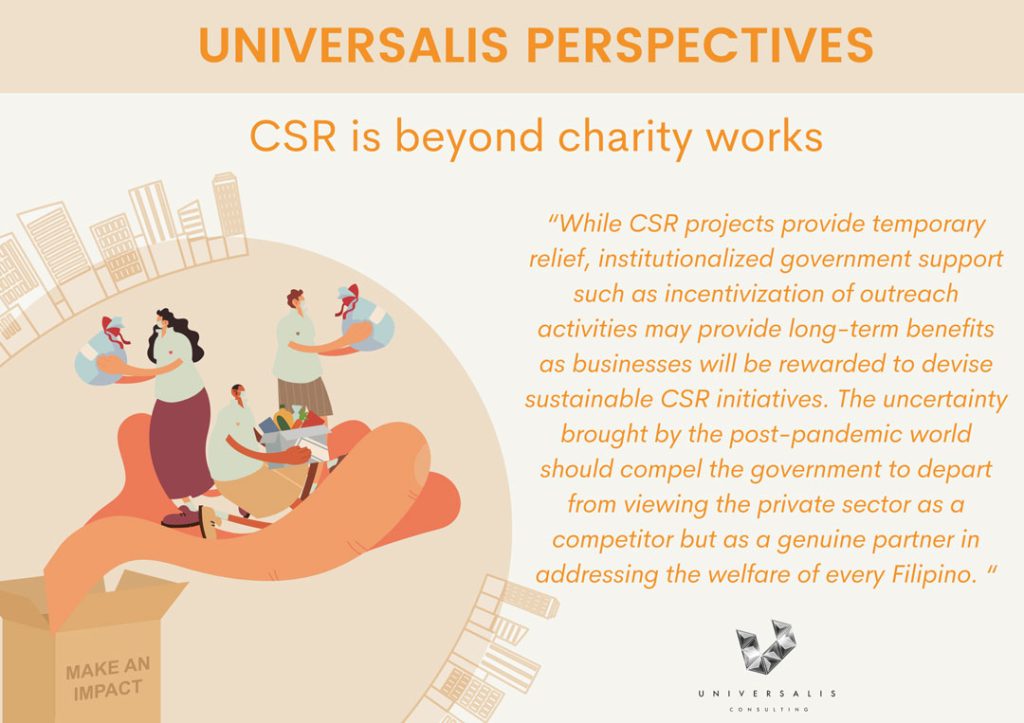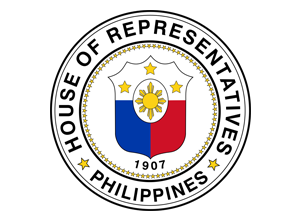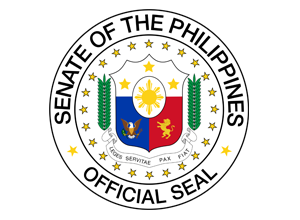Universalis Perspectives: CSR is beyond charity works

With 40% of the Filipino population at the end of 2021 are already fully vaccinated, the government was able to uphold its promise of a better Christmas for Filipinos. However, while the economy is gradually recovering from the effects of the pandemic, another tragedy struck the Philippines recently claiming hundreds of lives and millions of properties in the agricultural and infrastructure sectors.
Coinciding with the pandemic, the destruction brought by Typhoon Odette in Visayas and Mindanao left the government constrained by the unavailability of funds to provide an adequate post-disaster response and relief. President Rodrigo Duterte himself lamented that the government is looking for funds and aid to typhoon victims will be delayed.
Last 2020, the House of Representatives passed the Corporate Social Responsibility Act. At present, it is now the Senate’s turn to examine and scrutinize the policy proposal. Free market advocates welcomed the proposal as an opportunity to improve the country’s business environment and invite more firms to invest. On the other hand, progressive leftist and sectoral-based groups viewed the bill with skepticism by arguing that businesses will utilize the opportunity to influence policy outcomes regarding current restrictions on certain industries regarded as posing risk to the nation’s public health, environment, and other sustainability concerns.
Unfortunately, the current discourse on the issue has been confined on viewing CSR activities as mere charity works; ergo, incentivization of businesses’ CSR projects is simply a way to motivate businesses to practice civic and social responsibility. However, current discussions failed to grasp that incentivizing CSR efforts is entangled in a wider economic reality, and it is a proposal gearing beyond business incentives. We need to understand that the implementation of this proposed law is located in a myriad of economic entanglements. Below are some avenues to explore.
First, the execution of CSR projects involves manpower. Hence, it is possible to speculate that businesses can generate additional employment opportunities if the government will reward them for their innovative and cross-cutting social responsibility philosophy and programs.
Second, if CSR programs lead to job creations, therefore, we can also conclude that the conduct of social responsibility projects also contribute to upskilling of the Filipino workforce. With the pandemic redefining the nature and future of work, the nature of how companies implement CSR projects is also affected due to the preference on contactless interactions. Hence, companies are now using a variety of software tools and platforms to monitor the developments of respective projects as well as public feedback in social media. Such trend is important as the Filipino workforce also anticipates the arrival of the Fourth Industrial Revolution (4IR).
Third, CSR incentivization is in-line with Philippine regional economic commitments. The wisdom behind the proposal is aligned with the goal to create capital and investment mobility among countries. With the passage and implementation of the CREATE bill provides a timely opportunity, provision of business incentives for companies performing CSR projects can attract additional foreign direct investment to the country particularly with business players in the Southeast Asian region. Thus, CSR incentivization may positively contribute to the objectives of the ASEAN Economic Community and the Regional Economic Comprehensive Partnership (RCEP). In fact, the Philippine version of CSR incentivization is more encouraging compared to its Southeast Asian neighbors. Take the case of Indonesia’s “Law 40/2007 on Limited Liability Companies”. The Philippine version has a more comprehensive approach as it includes all industries regarding incentivization. On the other hand, the Indonesian version pursues a Pavlovian logic by specifically threatening firms involved in extractive and natural resources industries the possibility of lawsuit if they failed to provide CSR projects to the affected communities of their operations. In addition, economists predict that a “scramble for capital” between countries will occur after the pandemic. Incentivizing CSR initiatives will serve as an attractive bait to lure foreign investors to operate in the country.
The fears and worries of the proposal to incentivize CSR activities are valid and must be acknowledged. However, since the bill is still under deliberation, the proposed law can still be improved. Below are some recommendations.
Since the current version of the bill provides a comprehensive scope of possible CSR commitments including the environmental sustainability, lawmakers should consider including the other executive departments, bureaus, and agencies who will formulate the implementing rules and regulations. Through this way, we may pacify the worries and ire of those who oppose the bill.
On the other hand, lawmakers may also pursue a compromising attitude to consult the stakes of every industry and examine possible safeguards – balanced and reasonable – to ensure that both the government and businesses will not lead to possible abuses of discretion and excessive unlawful practices.
Finally, proponents of the bill should also align the provisions of CSR incentives to other Southeast Asian countries. Such step is necessary as the forthcoming ASEAN Economic Community in 2025 requires policy alignment among member-states. In addition, since the Philippines is a member of the World Trade Organization, the country needs to adhere to the principle of “national treatment” which requires WTO member-states to practice similar treatment both to domestic and foreign firms operating inside a specific territory. Policy proponents must ensure that the benefits and incentives the government will provide to companies will not go against the national treatment principle.
Despite relaxation of mobilitiy restrictions as more Filipinos are getting vaccinated, there are still Filipino households who are experiencing extreme hunger and financial hardships. Add to the equation the thousands of Filipinos whose livelihood, residences, and future were destroyed by the recent calamity. These realities are also aggravated as the presence of the Omicron variant has been confirmed inside the Philippines. Given these urgent scenarios, the government must learn to trust and place its faith to the goodwill of the private sector through their CSR projects. We are not yet out of the pandemic because of the threat of the Omicron variant. Consequently, tropical countries like the Philippines should brace for more stronger typhoons to come due to climate change and global warming. The government cannot carry this burden alone. The private sector is willing to extend its assistance as our people cannot rely on the virtue of resiliency alone.
While CSR projects provide temporary relief, institutionalized government support such as incentivization of outreach activities may provide long-term benefits as businesses will be rewarded to devise sustainable CSR initiatives. The uncertainty brought by the post-pandemic world should compel the government to depart from viewing the private sector as a competitor but as a genuine partner in addressing the welfare of every Filipino.


